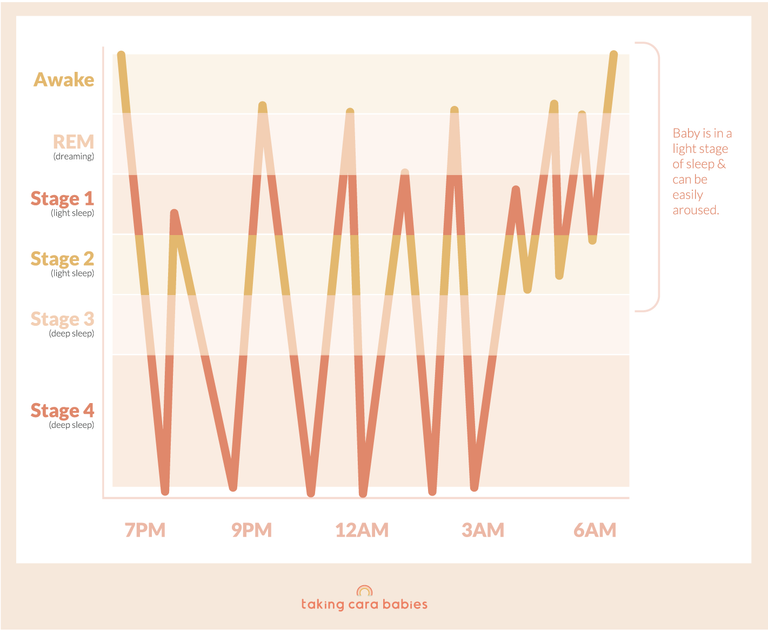Around 4 months, there are major developmental progressions that can make sleep tricky. People often call this the 4 month sleep regression. Let’s talk about what causes this regression, how long it lasts, and how to get through the 4 month sleep regression.
What is the 4 month sleep regression?
“Sleep regression” is a common phrase used to describe a temporary disruption in your child’s sleep, like waking more in the night, taking shorter naps, or fighting bedtime. This is common during times of developmental growth or big transitions. Sleep can be impacted anytime your little one’s brain is busy focusing on physical, mental, social, or emotional growth.
At about 3-4 months of age, our babies can begin to struggle with sleep even if they seemed to be good sleepers before this time. Why? They’re going through so many developmental changes. One of the most significant is a biological change in sleep patterns. And when babies bodies and brains are busy with new changes, sleep can often take a back seat.
Are sleep regressions based in science?
When a baby’s brain is busy learning new things or developing, sleep can take a back seat.(6, 9) Also, as babies grow, their sleep needs change.(2,7,8) This means a baby may begin to struggle with more night wakings, with nap refusals, and with falling asleep. When sleep is interrupted this way, it can feel like everything is moving backwards, hence the term “sleep regression.”
However, sleep isn’t actually going backwards or permanently “regressing.” Sleep skills don’t just disappear at magical ages. When I talk about common sleep regression ages, I’m talking about ages when babies and toddlers often experience periods of development (physical, cognitive, social) or commonly have a change in sleep needs (Think fewer naps, more awake time, etc..). But truly, all babies develop at their own pace, meaning sleep could be interrupted because of new skills, cognitive progressions, or physical shifts at any age.
When does the 4 month sleep regression start? Can the 4 month sleep regression start early?
For most babies, the 4 month sleep regression happens around 4 months. However, you may notice your little one showing signs of this regression as early as 3 months or not until closer to 5 months.
Why does the 4 month sleep regression happen?
The 4 month sleep regression is the first of the most common sleep regressions. But did you know it’s the only sleep regression that’s actually related to a biological change in sleep? It’s true! While all sleep regressions are associated with developmental progression, there is a shift in sleep around 4 months when babies move from the newborn phases of sleep into more adult-like sleep stages.
Let me explain how this can cause trouble. Adult-like sleep stages string together into “sleep cycles.” These cycles last 60 -120 minutes during the night. After each sleep cycle, your baby’s body will come to a light stage of sleep and often slightly awaken. They will check in with their environment, making sure that everything is okay and their surroundings are unchanged. See the chart below to understand what this looks like over the course of the night:
For some babies, each slight awakening turns into a major struggle. These babies usually fell asleep in mom or dad’s arms, at the breast or bottle, or being rocked.
Let’s play out that scenario: Perhaps your baby fell asleep in your arms and then is set down in the bassinet fast asleep. After about 60 - 120 minutes, they awaken and check in with their environment. Sometimes that sleep pressure is so strong, your baby simply drifts right back to sleep. Other times, they awaken more fully, and guess what their little body says during the check in: “Hey, this isn’t right! My surroundings are different. I was in Mom’s arms when I fell asleep. Where am I now? In this cool, flat bassinet! I don’t like this! Mama, come get me.” (Can you blame them? What if you fell asleep in your bed and awoke a few hours later in a different bed? Wouldn’t you freak out and cry?) Our bodies expect our surroundings to be unchanged during those wake-ups. This is the beginning of sleepless nights called “the 4 month sleep regression.”
Now, there are also a few other developmental reasons you may see a sleep regression around 4 months:
Changes in sleep needs: As babies reach 4 months old, wake windows need to increase to about 90-120 minutes. If your baby is on the lower end of this range, slowly add a few minutes to each wake window. Be sure to give your baby a few days to adjust to each shift then reassess; gradual change will prevent overtiredness. For some 4 month olds, it may even be time to move from 4 naps to 3.
Feedings: When our babies wake in the night, we often assume they must be hungry, so we feed them and they fall back to sleep. For babies experiencing more night wakings during the 4 month sleep regression, this tends to mean an increase in feedings overnight. At the same time, I often see an increase in distracted daytime feedings around four months.
So, guess what happens when you see distracted daytime feedings and more night feedings?
Your baby will wake up in the night genuinely hungry. This is called “reverse cycling."
New skills: Your four month old may be rolling or showing signs of rolling, babbling, and improving their hand-eye coordination. As your baby is learning these new skills, sleep may be disrupted.
Expert Tip: Many babies at this age are rolling or showing signs of rolling. That means it’s time to transition out of the swaddle for safety. If this feels scary to you, a transitional item like the Swaddle Sleeves Sack (code CARA10 saves 10%) or Merlin’s Magic Sleep Suit can help.
What are some signs of 4 month sleep regression?
Here are some of the common 4 month sleep regression signs:
-
Waking in the night when sleep was previously going well
-
Taking shorter naps
-
Fussy all the time
-
Won’t sleep unless being held
-
Taking longer than 20 minutes to fall asleep
-
Sleep feels “off,” and you’re not sure why
How to get through the 4 month sleep regression:
1. Know that changes in sleep are normal at this age.
Remember, your baby is experiencing a sleep cycle change that happens for every single baby. For some, it is a smooth transition. For others, it can cause some bumps in the road. Don’t let it scare you; you’re not alone in this.
2. Try to put your baby down awake at bedtime.
If you’re thinking “yeah, right, not my baby,” Navigating Months 3 & 4 can help you slowly work toward more independent sleep skills. I’ll give you practical steps to make progress starting today until you’re ready for sleep training with The 5–24 Month Collection.
3. Maintain adequate feedings during the day.
Continue offering feedings every 2.5-3.5 hours during the day according to your baby’s hunger cues. Remember, the 4 month sleep regression can turn into a reverse-cycling problem if your baby isn’t getting in those good feedings during the day.
4. Begin to expand wake windows.
At 4 months, you’ll want to aim for wake windows between 90-120 minutes. Getting enough active awake time during the day will help set your baby up for good naps and night sleep.
Typically, babies at this age need around 90 minutes for that first wake window of the day, 100-110 minutes for wake windows throughout the day, and then closer to 120 minutes for that wake window before bedtime.
Not sure where to start? I can help you with expanding those wake windows and knowing how to use your days to help prepare your baby for better nights.
5. Continue or begin a bedtime routine.
A bedtime routine provides time to relax before bedtime, helps cue your baby’s brain that sleep is coming, and can be an important opportunity for bonding. Including a simple bedtime routine (Think: feeding, pajamas, brush gums/teeth, read a book, sleep sack, crib) can help your baby prepare for sleep.
Expert Tip: Research shows us that babies and children who have a consistent bedtime routine are able to fall asleep more quickly, have fewer night wakings, and are more consistent sleepers.
6. If —by around 5 months of age— your baby isn’t sleeping through the night, know that you don’t need to struggle any longer.
The 5–24 Month Collection will walk you step-by-step through a completely customizable, emotionally-connected, holistic sleep training experience. In just a few weeks, your baby will be getting 10-12 hours of independent night sleep, AND you’ll have a plan to navigate any future regressions or bumps in your journey. I’ll also help you set up a daytime routine and nap schedule that fits your family’s lifestyle and values. And you’ll get age-specific guidance to meet your baby right where they are developmentally at every stage from now until your baby turns 2.
How long does the 4 month sleep regression last?
The sleep cycle transition usually only takes a couple of weeks. But…I have good news and bad news.
The bad news:
-
The effects of this transition, like the more frequent wakings and the reverse cycling, can last for a long time if you don’t have a plan to get on track (or back on track).
-
Your baby is unlikely to magically start taking in most of their calories during the day if they’re being fed every hour or two all night.
-
Independently falling asleep at bedtime and back to sleep during the night are skills that don’t just appear: they have to be learned.
The good news: The effects of the 4 month sleep regression don’t have to last for long!!
Can I prevent the 4 month sleep regression?
You can’t prevent the developmental and biological changes that happen at 4 months. However, practicing healthy sleep habits and working on sleep skills before the 4 month sleep regression can help set your baby up for an easier experience.
My Newborn Sleep Bundle will teach you a no-cry approach to help your baby fall asleep more independently. If your baby knows how to fall asleep independently in their own crib/bassinet, the 4 month sleep regression doesn’t have to feel so scary. Think about it this way: when your baby awakens slightly at a new sleep cycle and looks around, they’ll know their crib/bassinet and know how to fall back to sleep without intervention.
Some babies sail smoothly through this regression because of the skills they’ve already been practicing. Other babies have a harder time with this transition. If you are struggling, please know you’ve done nothing wrong. Even the best of sleepers can struggle during this time. Any practice you’ve done with these skills before and during the regression will still have a positive impact on sleep in the future.
Can you do cry-it-out or sleep train during the 4 month sleep regression?
I understand why you might be asking this question. When sleep feels hard, it can often seem like you are out of options. I don’t recommend any formal sleep training until your baby is 5 months, but that doesn’t mean all hope is lost this month. You can use the tips above to help you navigate this tricky time. When you ARE ready for sleep training, you don’t have to figure it out on your own or simply let your baby “cry it out.”
What are your self-care tips for tired and exhausted parents?
Please hear my heart: I never want to add stress to your life. My hope is for your whole family to thrive. I understand if being told to practice self-care feels like pressure. Perhaps you feel like you’re “supposed to” work out, eat perfectly, go to the spa, read a soul-touching book. You’re not alone if that feels like it simply won’t work in your life right now.
Let’s redefine self-care. Maybe self-care looks like watching a show while your baby naps on you, maybe it’s buying your favorite chocolate every time you go grocery shopping, or maybe it’s letting your partner or a friend snuggle with your baby while you take a walk after dinner.
I believe you are the best parent for your baby and no one could do it better! However, this does not mean that you have to do it all. Asking for help and seeking out assistance is vital for your mental and physical health. I want to give you confidence and encourage you to be kind to yourself.
That often means letting people in to help. Accepting and inviting help where it's needed allows you to do things that only you can do and the things you love to do with and for that sweet baby.
If you’re feeling like you don’t have any time for yourself because your baby is struggling with the 4 month sleep regression, know that my classes can help.









